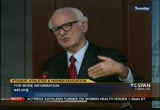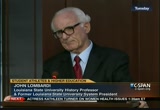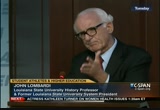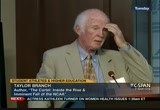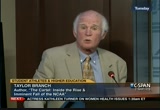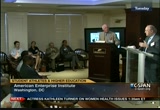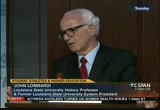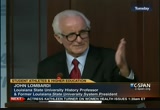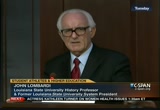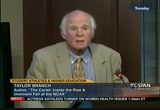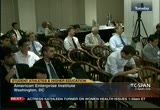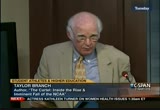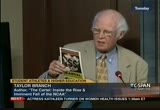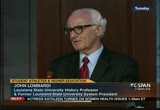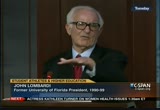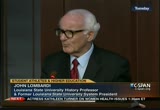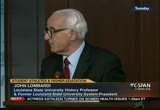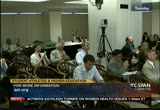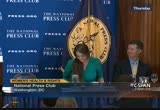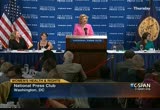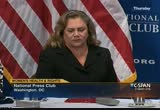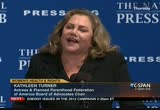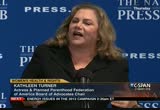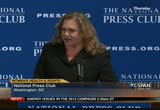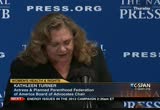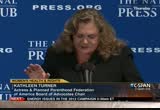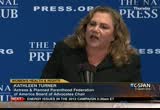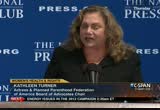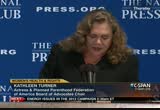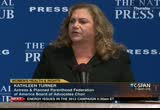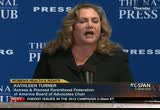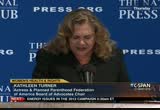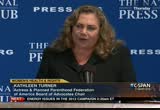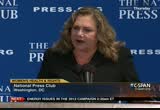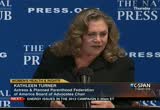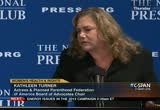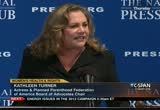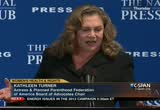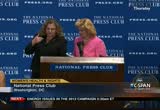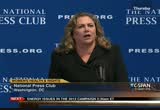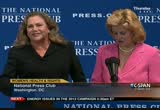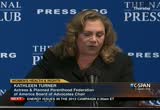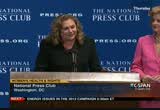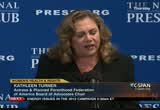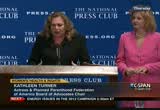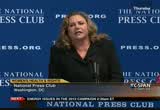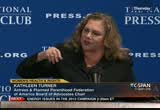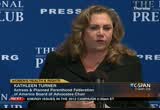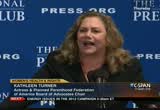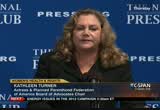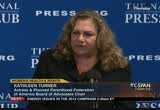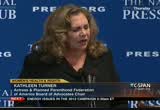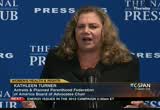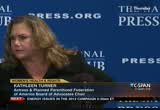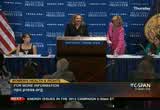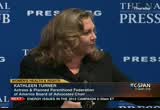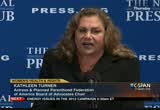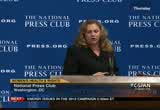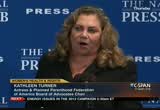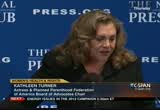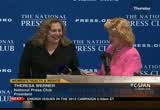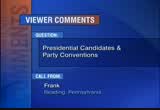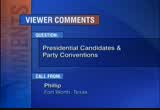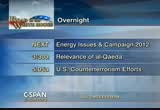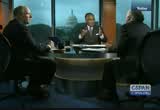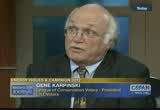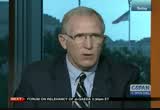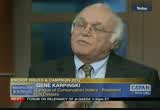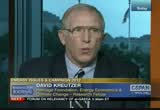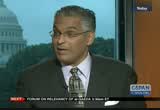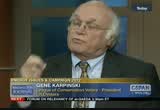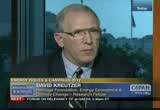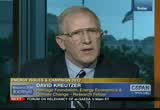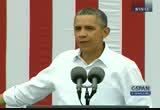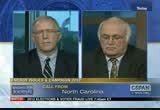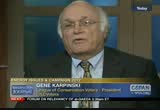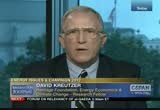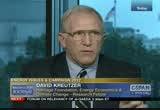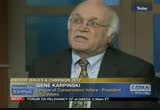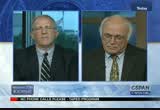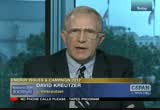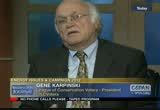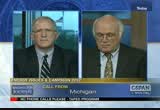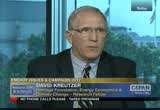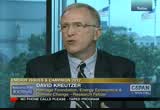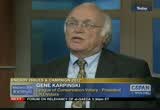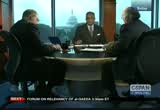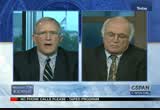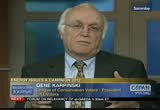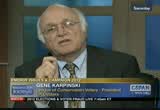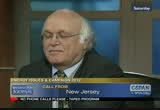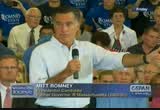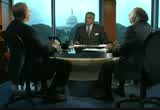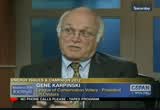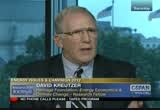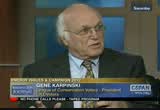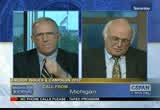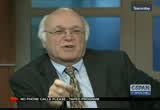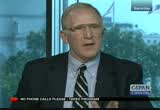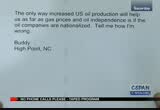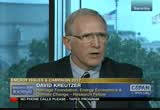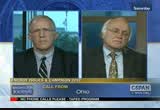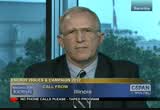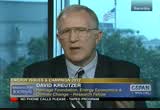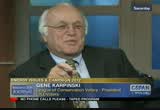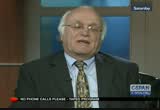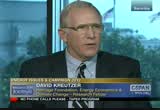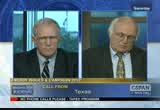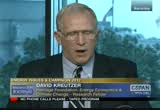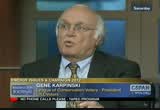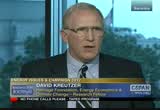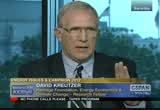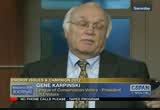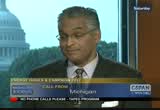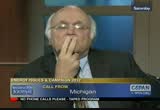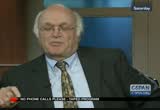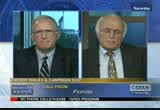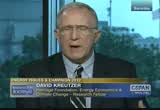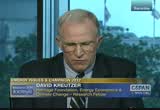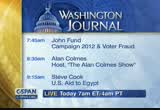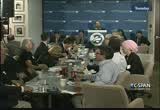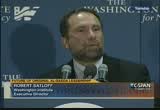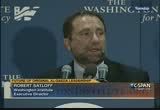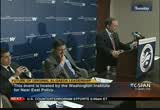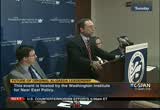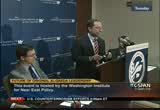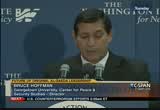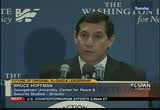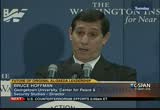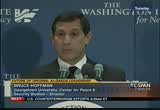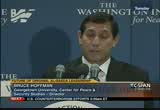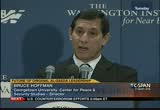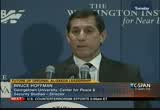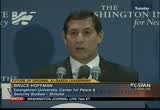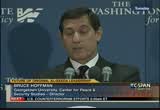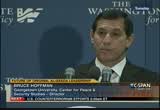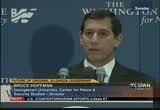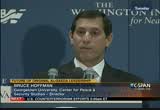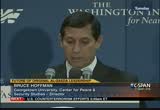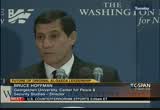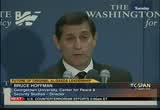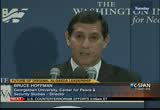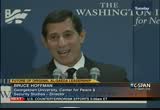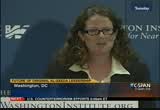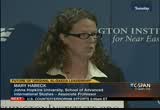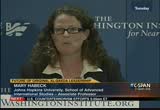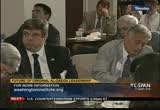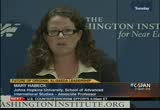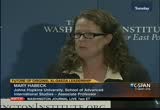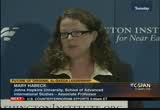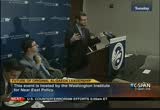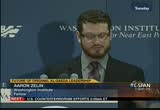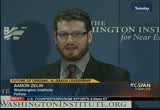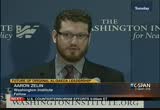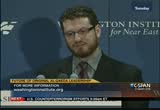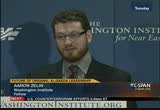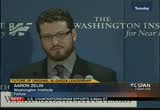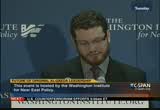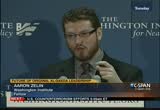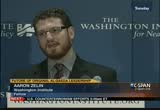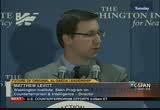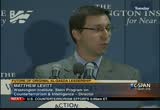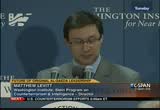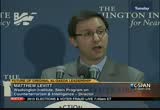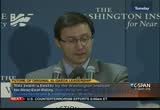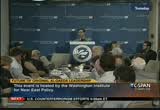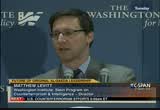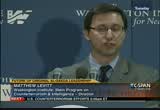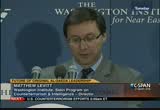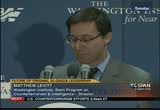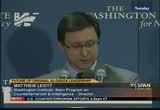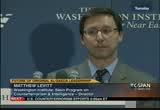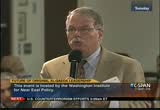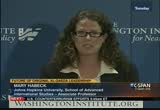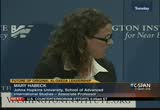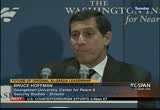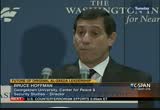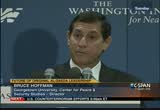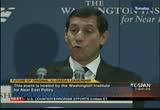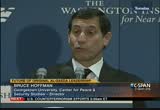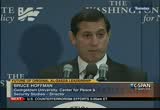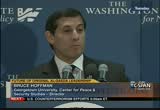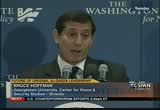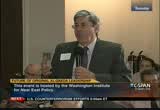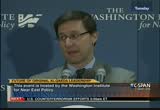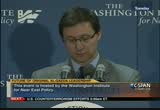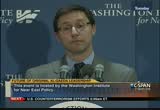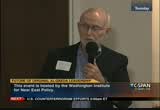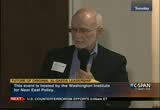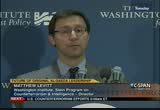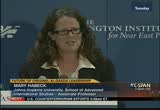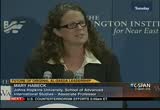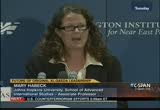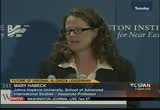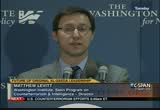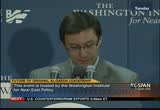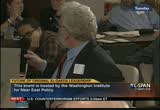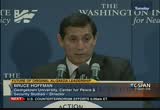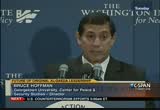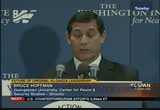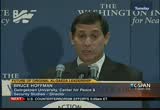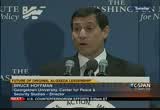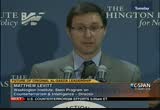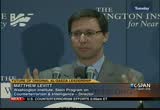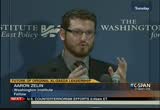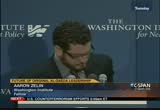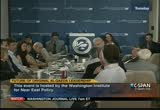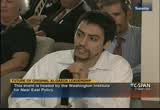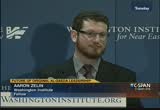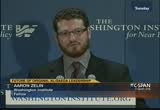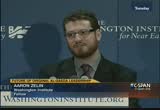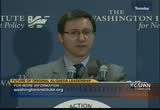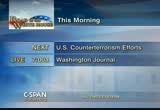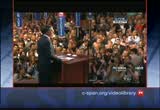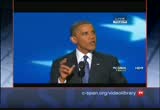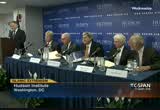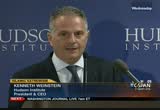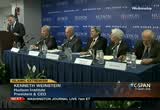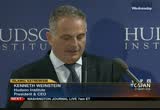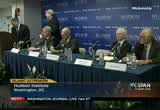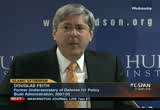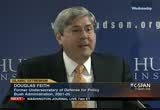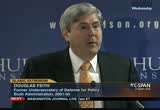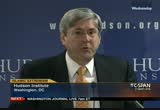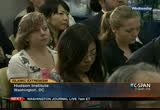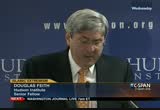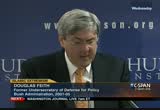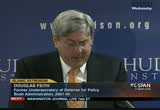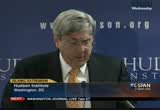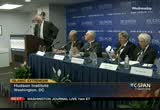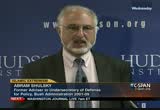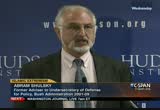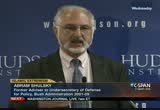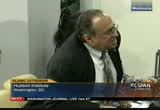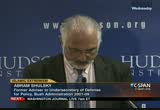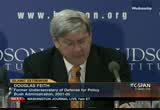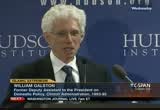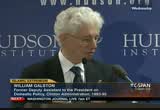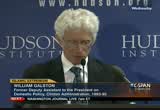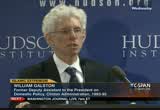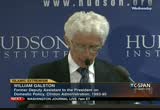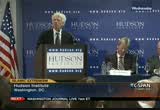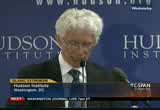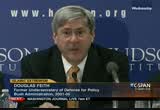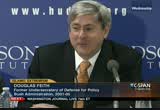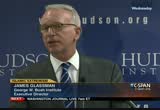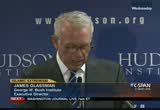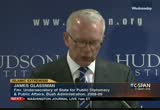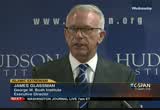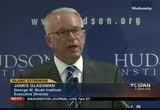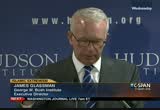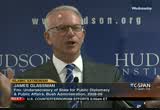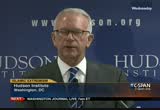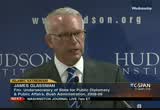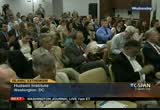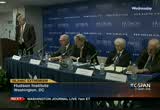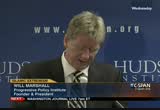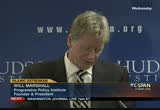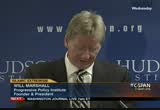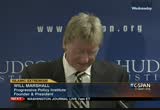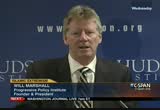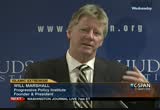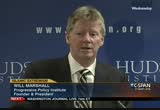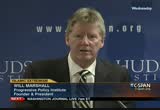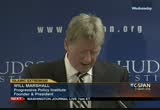tv News and Public Affairs CSPAN September 9, 2012 1:15am-6:00am EDT
1:15 am
from what they wanted to get more diverse, to introduce women, those of you who follow title 9, everybody dug in and said, we don't want it, the end of the world as we know it. the world will end. the world did not actually and. what happened was we got a whole bunch of high-powered women student-athletes. who would of thought in 1972 that we would end up here with 43% of our student-athletes women? not quite 50-50 yet. 43% is spectacular. if you look at what is going on in high schools and secondary schools as a result of this opportunity at the university's invented, they did it. the result is that this enterprise that we don't like, this enterprise generated revenue that made possible to support the women's sports. i would be happy to see another model put on the table that would be functional.
1:16 am
an operationto get worse than what we have now. i think it would break the bank. i think it would break the institutions. that might be a good thing. that might be the goal of the enterprise, to see if we can break the relationship. i think it would be a big loss. everybody pays attention to the top level. they are on tv all the time. you wonder what we invest for those people to be on television. look of what the university put in to make possible these incredible platforms on which the student athletes are able to project their skills and abilities so they can increase their value when they go pro. depend on how you calculate it, it could be up to hundreds of thousands of dollars a year of value for an athlete in the big time with all the support provided. it allows the program to succeed. the program is the key to the
1:17 am
success of this enterprise. the day you say there's one part of the program that will operate in a professional group, and one section will not, you will have a different business. i don't like the business better. >> someone is coming after you. they sent in question. i did not come up with this question. they said, how do you feel about the greatest academic scandal in n.c.a.a. history? this is flowing out of the football program, where there were sanctions. there is the dilution of the academic standard. how do we see that happening in some of these big college programs, where it looks like they're being educated, but they're not being educated? like they are being educated, but they're not been educated >> i fear terrible and pray that it does not see into the basketball program before this year. but it is a fairy tale liffey
1:18 am
think that most big-time sports programs don't operate the same way. i have taught at colleges -- a fairy tale if you think that most big-time sports programs don't operate the same way. i have taught at colleges. i am off the list -- the function of the athletic department is to steer kids into courses that can keep them eligible. that is why the notion that the n.c.a.a. is in charge of the student athletes and that that is the solution is so false. the university in ambiguous they should be in charge of whether the student is a student. it is already separated, dr. lombardi. we have a commercialized, high monetized system and it's only distinction that it excludes the
1:19 am
value part of -- excludes value by large artificially. you cannot say that this is empowering and enriching ones were going pro and say that only 1% of them are going pro. all of these athletes are generating value. the guards, the interior linemen are generating value in the big game. they are all being invited to play. the third string player is getting money just like tim t. bowen they steal the money around them and they are in code -- like to empty bow -- like tim tebow and they see all this money around them and they are encouraged to fantasize. >> taylor has written a lot
1:20 am
about the commercialization of images in ways that the universities will profit for decades after the fact whereas the players are long since gone. you sometimes look at other market mechanisms that might able to change these incentives around. when about deferred comp? -- what about deferred cop? -- deferred comp? >> whether you pay them before or behind, they're not stupid. they're getting paid. in our effort to try to maintain the separation of the intercollegiate sports enterprise and the commercial enterprise, we have a tough time succeeding with that, in part because of the enormous media attention provided, which generate all this stuff.
1:21 am
so we have some rules that are very difficult to take seriously. we have one rule this is you cannot commercialize the name of a student athlete. so you buy a sweatshirt with his number on it. who are we fooling? when you saw the skirmish -- when you saw the sweatshirt with number on it, who does the represent? that represents tim tebow. there could be a model to deal with this. let me give you an example. we produce something like $14 million a year in intellectual property returns on licenses and patents and royalties and that kind of thing. that is another business of the university. that is a college business. so the college students and the postdoc students are not paid. they are all paid a flat rate, whatever the grant provides
1:22 am
print and it is a crappy money. they would like to have the deals that student athletes have. they make it possible for us to produce this terrific scientific out pos. maybe down the line, it could make a gazillion dollars, but we don't know. student athlete in the university of florida does not know if you will end up with a contract with gazillion dollars. you have to try to pay attention to how you do that. you might say that, when we have a lot of money on an image, whether it is ea sports or someone else is using it, then they get paid after being student athletes been not ahead of time or giving them in havence, but after they bea been a student athlete. it seems to me that we have a license agreement for participating in the project.
1:23 am
there are a lot of rules about who and how we participate in this. i think we probably ought to pay attention to that kind of a conversation. >> we are coming up on our closing statements. you have five minutes apiece to wrapup. >> thank you. this is a very complicated topic. it is burdened with a lot of history and a lot of reflects actions. the hard part for me was to get past the notion that everybody that i ever talked to outside of the college athletic locker room feels that we presume that we should have a say on how this thing should be structured before debating what the primary role of the people who are
1:24 am
actually producing this value is. we presume to settle questions of their rights. by and large, we bounced off of those questions. to me, that is scary. as an echo, as a civil rights historian and a racial historian for closing and some were the colonials said they're doing all of this for the best intentions of the natives. i got on it into a lot of trouble on steven colbert when he asked me if college athletes were slaves are not. of course not. they are in some ways, as dr. lombardi says, privilege. they have the opportunity to do this. but it is also true that nobody wants to state the principle by which their rights are uniquely a bridge in our society. we bounce off of that. that to me is an echo of slavery. because nobody wants to deal
1:25 am
with the abolitionist even after the end of the civil war, not because we thought the abolitionists were wrong, but because we were afraid the abolition ears were right. -- that the abolitioners were right. i have a three-point agenda that i think will apply to the future trouble the education as well as the future of sports. i will now read it here, but it is my last bid. if your interested, i brought all of these cards. transparency and balance -- transparency is a big problem for actual information. most colleges don't really have information and tell me they don't have accurate information on all of the contracts and promotional things that are going on in the athletic department. but transparency should include all the stakeholders, including faculty and everybody involved in government. second principle, the academic
1:26 am
mission with an intercollegiate sports at a high level -- we need to get all of the stake holders at the table. the system needs to be open, transparent. maybe you cannot do it, but at least it should be (the third and the only one i will read is equity. if you don't deal with equity and you don't deal with it successfully, all the rest is wasted breath and you're just waiting for the course or some collapse to change the system exogenous lee without dealing with the principle. to me, equity is the important one. colleges and universities show respect the basic rights of all students, applied consistently to athletes and non-athletes alike, on campus as under the law, both students will obtain the full attributes of citizenship. this includes the rights and duties of full consent, representative government and a process. no french of the bridge because of athletics that this --
1:27 am
athletic status. -- no right shelby abridged because of athletic status all legitimate enterprise coming therefore separate from their school. tell me on what basis you object to that and you can build the n.c.a.a. on the back of that lease whose rights are uniquely abridged and is festering along with the other problems in higher education because the place that is supposed to have brave thought does everything by assumption and that is the very thing that it lacks. confront the basic definitions. that is where government and reform starts. thank you. >> ok, i think there is a misconception out there that there is some of some secret stuff going on. and there may be. most of it goes on in private universities because we cannot
1:28 am
see what they do. but for any of the big public universities involved, everything they do is available under public information and the newspapers are good at that. stuff i don't have, they can get and give it to me. the n.c.a.a. it provides an extraordinary amount of information to the universities that are a part of their enterprise. it may be that the presidents don't pay attention and maybe they don't watch and maybe they do want to know. there are all kinds of reasons that people don't pay attention to information that is available. but those who want to know where the money is and who is getting paid what and want to know how the institutions rank in terms of what they spend and what the deficits are and where they are generated -- if they want to know where the money is spent and where it comes from, all of that is detailed in enormous detail. secondly, the n.c.a.a. is not a secret enterprise. it is run by the university presidents and they bring an athletic directors and coaches
1:29 am
and other people to provided by some council, especially on the rules and regulations of the game. but the main role of how the thing up bridges done by the university presidents. now, if the university presidents and their trustees and their regulatory agencies and a faculty are willing to change the enterprise, all have to do is change it. and every change that has happened in the n.c.a.a. in the last 110 years has been driven by the president's deciding that the time has come to do something different in a different way. so the idea that you can attack the n.c.a.a. and somehow fix this misses the point. he has a good point. the point is that it is a higher education problem, not an n.c.a.a. problem. we are the n.c.a.a.. the universities do the n.c.a.a.. the rules are cast by the presidents. they're the ones to make the decisions. the conferences are run by the presidents. the fcc is run by the president. if the president's don't want to do something, then it does not happen.
1:30 am
so when they say, why don't the president's get involved, i will tell you why. because the trustees don't get involved. people who on the universities, the trustees, the legislature, those people, they don't want them to change it very much. no. 2, the constituencies of the university, the fans, the alumni, the friends, they don't want us to change what the universities do. will then you want to make the n.c.a.a. fix all this, you have the wrong target. the enemy is us. it is us, the university's pin is us, the fans. it is us, all of you who watch it on television and by the tickets at outrageous prices and by skyboxes. you are the people who make the terprise what it is today and you should take full responsibility for your participation when you wrap this all up and you put it on the news and it is the only academic enterprise that has its own section in the newspaper -- sports.
1:31 am
does the history of a department have a section in the newspaper? hell no. you have a bad day lecture, do they write you of? no, they don't. are you on the front page of the news? no, you are not. and who makes that possible? the ones who want the sports enterprise to be the way it is. the miracle is that the universities and the n.c.a.a. resisted as many pressures as they have and have been capable of sustaining the simmons enterprise that has no counterpart anywhere else in the world and have managed to provide this huge base of support for so many years in a standardized and effective franchising system. >> all right, i think we have had a highly competitive activity. a lot of points were put up on the board. upon further review, i have decided to take people egg off the field. please thank our debaters. [applause]
1:32 am
>> in four weeks, the first of the presidential debates, live on c-span, c-span radio and c- span.org. next, actress kathleen turner on women's health and reproductive rights. then a discussion on energy issues in the 2012 campaign could after that, exploring the relevance of al qaeda today. on "newsmakers" darn larsen, chairman of the democratic caucus. he looks at the impact of wisconsin congressman paul ryan as the gop vice presidential candidate. sunday at 10:00 a.m. and 6:00 p.m. eastern on c-span. >> i watch c-span, c-span 2 and
1:33 am
the book portion of c-span because i feel it is important to be knowledgeable about what is going on in the world and i feel that c-span gives the most information about what is going on on specific subjects where a lot of television doesn't do that. >> still repeat watches c-span on comcast from c-span, created by america's cable companies in 1979, brought to you as a public service by your television provider. >> actress kathleen turner serves as the chairman of planned parenthood's board of advocates been she spoke thursday but women's health issues and reproductive rights at the national press club. this is one hour. >> good afternoon and welcome to the national press club. my name is theresa werner and i am the 105th president of the national press club. we are the world's leading professional organization for
1:34 am
journalists, committed to our profession's future through our programming and events such as this while fostering a free press worldwide. for more information about the national press club, please visit our website at www.press.org. to donate, please visit press.org/institute. i would like to welcome our speaker and those of you attending today's events. our head table includes guests of our speaker and journalist for club members. if you hear applause in our audience, please note that members of the general public are attending. so it is not necessarily a lack of journalistic activity. -- journalistic conductivity. i would like to welcome their c-span and public radio audiences. her luncheons are also featured on our weekly podcast from the national press club available on i tunes.
1:35 am
you can also follow the action on twitter, using #npclunch. after our speech concludes, i will ask as many questions as time permits could now i would like to introduce our head table guest and i ask each of you here to stand up as your name is announced. from your right, mark bueno. laura lee, editorial assistant at npr. marylou donahue, editor of artistically speaking with marylou donahue and art website. molly smith, arena stage artistic director appeared leery lipman, a senior editor at aarp bulletin and former national press club president. rachel weiss, daughter of our speaker and singer-songwriter. [laughter] allison fitzgerald, freelance
1:36 am
journalist and chairwoman of the speaker's committee. i was -- i will skipper speaker for just a moment. marilyn, sr. business news editor at npr and members of the speaker's committee and organizer of today's event. phyllis, i guess of our speaker, did the guest of our speaker -- guest of our speaker , peggy ankle, a playwright and club is to remember, nancy hughes, julio aliaga, freelance journalist. [applause] harrod speaker today, kathleen turner, is an actress and a civic activist. she first came to prominence in the early 1980's when she starred as the femme foot-tall -- femme fatale maddy playing
1:37 am
opposite william hurt in the thriller "body heat." [applause] she went on to star in a wide range of popular films and plays, and even provided the voice for jessica rabbit, the acclaimed animated movie "who framed roger rabbit?" but even as her acting career was blossoming, turner maintains a deep interest in civic events. the daughter of a foreign service officer, she lived as a girl in venezuela, canada, england and cuba. she graduated from the american school in london and later from the university of maryland, baltimore county. she has been a decades-long member for people of the american way and a longtime supporter of amnesty international. she not only thinks globally, but acts locally through city meals with whom she volunteers as a meal delivered in new york city where she lives. [applause] turner serves as the chair of the planned parenthood federation of american board of advocates and has testified before congress on reproductive rights, which is her topic here today.
1:38 am
besides acting and doing political work, turner is doing one thing -- helping to keep the spirit of molly ivins alive. she was a newspaper columnist whose passion for politics made a religion. turner beens. that is because when former texas gov. ann richards was undergoing cancer treatment in manhattan, she happened to move into turner's apartment building. one day, ivins was visiting with richards and the ran into turner. they invited her out for an evening of laughter, paul stories and giving turner a -- tall stories and giving turner a unique appreciation of -- tall stories and giving turner a unique appreciation of ivins if you have not already seen the play, the national press club journalism institute
1:39 am
1:43 am
about what i have to say. i do not lend my name to groups to use on a list. i invest in the issues i care about and the organizations are respect and i give what time i can. when i am home in new york city, i am a board member and volunteer for city meals on wheels. sometimes, i get to deliver to older people who can no longer get out, although many of them really don't know who i am, except that i am a person from sitting meals. and a couple of times, they have given me the complement of saying that i should consider acting because i have such a nice voice. [laughter] now one of the issues i care most deeply about is the health, safety, well-being and rights of women. i am shocked that in this year's election, women are facing the biggest threat to their freedoms that i have seen in my lifetime.
1:44 am
consider family planning -- the center for disease control considers the availability for family planning, the ability for women to have greater control over the timing and number of children they have to be one of the top health advantages of the 20th-century. numerous research papers have linked the introduction of the birth control pill with positive social and economic gains for women. from completing higher education to marry later to narrowing the pay gap. earlier this year, the national bureau of economic research found that earlier access to the pill was linked to higher hourly wages later in life. this is no trifling fact in a sagging economy.
1:45 am
40% of working wives are out- earning their husbands. so why, here in the 21st century, are so many people trying to reduce women's access to family planning? it does seem as though we are going back in time. it simply does not make sense. didn't you journalists just feel some professional sympathy for andrea mitchell who tried to keep a straight face and go with an interview with conservative under who said that girls could afford contraceptive by putting in aspen between her knees? -- could save on contraception betweenng an aspiring their knees?
1:46 am
that was silly. but attacks on family planning is not a joke. hear, seven states restricted or barred any family-planning funds from going to planned parenthood or any other health care provider that also provides abortions. when i was visiting the planned parenthood affiliate in los angeles, it happened to be a day when they were providing abortions. now the doctor in charge of the clinic whispered to me, as we toured, that, of course, friday's was the day that they offered vasectomies. i had to ask her if they ever encountered people outside the clinic trying to stop men from entering. [laughter] it gives you something to think about. [applause] one in five women in america use or have used planned parenthood services, much to the benefit of men also appeared but all of the -- benefit of men
1:47 am
also. but all over the country, conservative politicians try to outdo each other in calling for the destruction of planned parenthood. do they really have no concern for the millions of women who rely on planned parenthood for basic health care and, yes, contraception is a basic health care. it is essential to the health of women and the well-being of their families. if a woman cannot control her reproductive choices, she cannot control her life. every single republican in the house of representatives has voted to amend -- to amend title 10 family planning funding. every single one. these a the same people who keep talking about saving taxpayers money. of getting to the guttmacher -- according to the guumacher
1:48 am
institute, family planning services helps women avoid 1,940,000 unintended pregnancies each year, which would result in 860,000 and intended births and 810,000 abortions. every dollar saved taxpayers $3.74 in medicaid costs, eliminating the family planning program would cost taxpayers billions of dollars in increased health care. and then we have the so-called personhood bill. this would give full legal rights to raise zygote at the moment that sperm meets egg. i have always wondered how do they know? [laughter] the personhood movement not only proposes to redefine pregnancy as occurring at the moment of fertilization, even though half of fertilized eggs do not result in sustainable
1:49 am
pregnancy, but also wants a zygote weeks away from a potential pink + sun on a stick do we recognize as a complete human being with rights. this would criminalize most of the common forms of contraception. not to mention the usual fertilization treatment and stem cell research as well as complicates the legality of medical intervention in the event of a life-threatening pregnancy. what i should tell you is that this personhood law was even too extreme for the voters of mississippi. the voters of mississippi absolutely rejected it. but mitt romney has said he is for creating legal protections in the constitution if necessary from the moment of
1:50 am
conception. either he doesn't really believe that and was saying what he needed to say to get the nomination or he does believe it, in which case, american women and men in their lives have better understand what this means. we need to explain this to people because mr. romney most certainly will not. the future of family planning and a woman's ability to make decisions about her life and her family are now the only things -- are not the only things at stake for women in this election. access to health care is on the line. some states are saying that they will not participate in an expansion of medicaid under the affordable health care act. that would leave more women outside the safety net. of course, mr. romney has promised to get rid of this altogether.
1:51 am
we are already seeing the effects in texas. last year, gov. terry slashed -- gov. perry slashed funding to women's health, resulting in 180,000 women losing access to preventative health care this year. and he has effectively sabotaged the medicaid women's health program which provides preventive care, including cancer screenings to 130,000 low-income women each year. earlier this year, mr. romney said he would oppose the blunt amendment, which would allow any employer to restrict any employees' health coverage based on the employer's religious beliefs. that did not go over too well with the far right. so it took him about an hour to back away from that position and to say that he does not in fact support the amendment,
1:52 am
which would endanger access to contraception for 20 million american women now dr. linda rosen stock, who is the dean of public health at ucla and chair of the nonpartisans institute of medicine's committee on preventive services for women, says that if every employer could decide what services they thought their employees should get, if we all of a sudden open up our celt -- our health care system like that, we would wreak havoc. if one employer did not like vaccinations -- some of them don't -- we cannot have employers dictating health care for individuals. and there is domestic violence which affects one in four american women during their lifetime. according to the justice department, three women die every day as a result of
1:53 am
domestic violence. in the past, the violence against women act was passed with strong bodice and support. -- strong bipartisan support. but right now, if we -- the reauthorization is being held up because of the republican house of representatives projects elements of that would protect -- republican house of representatives rejects elements of that would protect native american women and lgbt victims of domestic violence. and how about fair pay? women make 77 cents to the dollar, relative to men. in 2009, congress passed and president obama signed the lilly ledbetter fair pay act. it is the name of a woman who
1:54 am
was discriminated by her employer for more than two decades but could not get justice because of the supreme court's conservative majority came up with a creative new way to read laws against job discrimination. the lilly ledbetter ad provides struggle protection for women and some states are doing now the opposite, weakening women's legal protections against discrimination. it was brought to my attention the other day that extraordinary money wielded by a few men behind the far right conservative movement is aimed perhaps not so much at electing romney and ryan, but in fact in the senate. who knows what would happen if that were in republican hands. so all right, why? why? when women are 51% of the work force, 57% of higher educational degrees, primary care givers at home, primary consumer force in the
1:55 am
marketplace, why have we done so little to protect ourselves in this political arena? so little to demand equal representation? [applause] i want you to imagine something with me. imagine, if there was to be one day, say, the monday after mother's day, and easily communicated now by our social media, when women choose to stay home, not to gather anywhere or under the aegis of any organization, but just stay home. to sit down for a day and gather our collective breaths. can you imagine what kind of made him this would mean? -- what kind of mayhem this
1:56 am
would mean? [laughter] from the juice in the morning to the commuter in the workplace, television, the national defence, the food industry, transportation, all the way through to that good night kiss -- none of it worked without the women of america. we would surely show the country what an essential element we are. but perhaps more important, we might show ourselves. [applause] i do have hope that the next generation will be different. people for the american foundation -- the american way foundation has a young elected officials network and we have hundreds of progressive people who have made it into public office before the age of 35.
1:57 am
this includes some exceptional young women who i know will be serving in congress before long. they are not willing to be complacent or compliant or complicity in leading ideologues -- or complicit in letting ideologues return -- determine their health and welfare or restrict their possibilities in life. and we need more women to follow their example. if not, to run for office themselves -- if not to run for office themselves, but then to actively take part in this election. i believe that women can be in 2012 with the youth was in 2008. i know that all of you might not make it to an arena stage, so i will give you a little piece of mali here -- of molly here. [laughter] once upon a time, we had a newspaper editor in waco named william brandt. he hated to things, hypocrisy
1:58 am
-- he hated three things, can't, hypocrisy and baptists. he said, the only trouble with our texas baptists is we do not hold them under water long enough. [laughter] [applause] now, brandt left us when he was shot in the back by an irate baptist. lying on the ground died, he got his own gun and blew his head to kingdom come. that was one way to get out of town. but i need more than that. i need a trumpet call here. many people in the streets banging pots and pans. do not throw away our legacy at of cynicism or boredom or neglect. you have more political power than 99% of the people who have ever lived on this planet give
1:59 am
-- planet. you can vote. you can register others. you can make signs, march, all your life, no matter what else to do. you have another job. you are a citizen. politics today stinks'. it is rotten. these are some bad, ugly and angry times and i am so freaked out. but cult -- but politics is not about left or right. it is about up and down, a few screwing the many. it is not too hard to figure how to fix this. stop letting big money by our -- big money buy our elections. here is the score now. every calculating coming equivocating, triangulating, hair splitting son of a bitch in office today spends half his time whoring after special- interest money. if officials were electedif offy ordinary citizens again, they would have to dance with but box, the
2:00 am
people -- they would have no one else to dance with but us, the people. that would give me hope. [applause] i have hope that common in this election, women will be empowered and active for ourselves. thank you. [applause] >> last month, a court -- from the state postal medicaid program. now planned parenthood is
2:01 am
asking the court to reconsider. you think the courts are becoming less friendly to reproductive rights? >> that is an easy answer. [laughter] yes, they are. unfortunately, one of the things that has not been driven quite as much as it should be in this administration -- and i will say that i think president obama deserves every credit we can possibly give him -- [applause] in any case -- let me get to my notes here -- but we have not filled the court as actively as we could have in this last term with the result that so much of the representation now in the courts and the control of the courts is still in the hands of previous administrations.
2:02 am
in texas, yes, what he refused to accept the medicaid in obamacare, thereby cutting funding to plants that provide not only abortion services but cancers keening -- cancer screening, ftd, every contraception, every aspect of essential health care for women, what has resulted and what i have been told just in the last week is that women are now crossing over to mexico to try to get some of the health care that they cannot receive in their own country. >> planned parenthood action fund hosted a fund-raiser at the democratic convention, but the organization does not reveal their donors. should planned parenthood do more to reveal funding sources and if not, why not? >> that is an interesting thought. as we all know, it is no longer
2:03 am
a requirement for any organization to reveal your donors or where the money comes from. obviously, if that were true, all of our politicians would be in deep trouble -- i was going to say something else, but this is a nice group. [laughter] seey opinion, yes, i don't why not. the only thing that would give me pause would be if people feared that their own reputation for standing in the community might be threatened by this knowledge, public knowledge. >> karen handel, a former pr vp at the susan g. koman foundation says that the charity was subjected to a vicious mugging by planned parenthood who she calls a bunch of schoolyard thugs.
2:04 am
his supporters go too far over her decision not to give grants to planned parenthood? >> the woman who wrote that is the same woman who ran for governor of georgia, is she not? and she was the one who ran on the platform of the funding planned parenthood and title 10. gee, do you think she has a point of view? she lost not only the election, but she lost her position. i was at the l.a. affiliate offices. i was there the day that the susan g. koman debacle hit and the phones were ringing off the hook. and what we heard over and over again was that what money they had that they were going to send to the koman foundation they would no sen to planned parenthood because they did not
2:05 am
trust that the foundation would transfer the funds that they promised to planned parenthood. what actually happened much of the time, i think, across the country was that people cut out the middleman because they simply did not trust them anymore. >> do you have any sense how reproductive rights are doing in the rest of the world? are women in developing countries getting more family planning help or not? >> i do have some knowledge of planned parenthood international. we have -- for example, i will bring up the one in kenya. we have a very thriving clinic there. i trust most of you know that most planned parenthood affiliates -- all planned parenthood's -- are essentially self supporting, even within our country. we do have our national planned
2:06 am
parenthood association which coordinate's and directs all the work of our affiliates, but we expect the bill is to be self supporting. -- the affiliates to be self supporting. the same is true -- we expect our affiliates to be self supporting. the same is true across the sea. one of the time that came down here to washington was to lobby for funding for an umbrella organization for planned parenthood into a national -- planned parenthood international. the idea was that, as the group here in the united states -- the united way is allowed to deduct from paychecks, yes? in order to have their funding, we wanted to have the same kind of thing possible for this
2:07 am
international overseas giving program, which encompassed about 10 very worthy groups. we were actually beaten down on that by the united way who did not want anyone else to have such president, such a privilege, even though the funds -- such a precedent, such a privilege, even though the funds would not be competitive. it would not be going to anybody else in the country but overseas. isen's health care considered in many places a luxury and certainly far down on the list of the imperatives for that nation's funding. >> what should we take away from the virginia state
2:08 am
legislators attend to require ultrasound for any women seeking abortions. [laughter] >> you know, it is a good thing my daughter is here. i woke up this morning -- somebody had brought this up yesterday and i was so bloody angry i said, you know what i am tempted to say and she said, don't say that, mom. so i will follow my daughters advice. i think it is a deliberately humiliating abuse. i think that, if such a thing were comparable for men, it would be unheard of. i am so angry that i will stop right now. [laughter] [applause] she did some may. >> speaking of your daughter,
2:09 am
in an essay in the aarp bulletin this spring, you talked about the process of transitioning as the parent of a young adult. he recounted when your mother said you that your choice of profession was only about yourself and she later apologized. what are examples about yourself -- about your career that shows the actors can touch people's lives? >> my mother said that -- i have an older brother and -- i have an older sister and younger brother. my older sister and is a doctorate of sociology and city planning. i enter brother is a doctor of psychology. i have a doctor of literature. i in your brother is a doctorate in computer and government planning and works for the new zealand government. my mother does have -- my gut -- my mother does love to have a
2:10 am
solid the same time and say, i would like you to meet my children, dr. turner, dr. turner, dr. turner -- [laughter] it is nice that that came about so well. that came about because she said that my siblings were all serving the community and the people in a way that i was not. my response was that, if i get the kind of work i intend to and the amount of access, you know, to the world, i will have more impact and i will change more lives than they will. now, that was a bit of a defensive remark from a 20-year- old kid, ok? [laughter] i was not putting them down. but i think there's a great deal, whether it is the choice of material that i may, whether
2:11 am
i'd choose women who fight, i have never done very well to choose a victim -- never will. [laughter] i think that the body of work over the years speaks up. ok. [applause] >> a question here on any device on how to let children go. >> that is a tough one. never! never let them go! don't do it! [laughter] you got that from me. it is tough. it is so hard. you know, for 18 years, you know where they are everyday.
2:12 am
you know what they are eating. [laughter] you know how much sleep they got and who their friends are. and then, overnight, you don't know who their friends are or if they're sleeping or what they're eating. i wrote myself a big note and i had it on the refrigerator in my kitchen when rachel first went off to college and said "do not call her every day." [laughter] >> yes. [laughter] >> it is so hard. most of you know. i think would really finally comes around is, after they get through the college period and are starting their real lives, then you become compatriots and you can talk about how your work affects your lives and how that affects each other's lives.
2:13 am
and that is really interesting. so it becomes another person in your life rather than a child. but though, my stars and garters, if the phone rings at 3:00 a.m., you know that your first thought is is the child alright? i cannot imagine that will ever change. nor why should it? >> i start pocket dialing. >> yes, don't pocket dial me anymore. [laughter] >> are people in hollywood into to this election cycle? if not, wire they not interested in president obama? >> first of all, let me be clear that i am not in hollywood. i have always lived in new york city. i have never lived in los angeles longer than it took to
2:14 am
complete a film or do a run of a play. the reason i do not live out there and have never chosen to is that, to me, it is a completely separate and insular society. i like being part of the world. one of the reasons i live to new york is that it is the closest i can get to the rest of the world and still be in the united states. i don't understand these people whose major interests revolve only around themselves. so don't ask me that question because i cannot answer it. [laughter] >> how does our can your advocacy for planned parenthood speak to both liberals and conservatives? >> we have great common ground. i don't believe anyone who is pro-choice -- and i will say anti-choice, not the other term
2:15 am
because that is crap. no one thinks of abortion as a method of birth control. we don't choose abortion lightly. the idea is to prevent unwanted pregnancies. planned parenthood's stand is every child wanted. now where is the problem with these anti-choice people? don't they want the same thing? which is not to have unintended pregnancies, to not have to make that terrible, terrible decision and all that it implies. come together, man. work with us here. we can do this together. i know it. [applause] >> how much of the push to
2:16 am
restrict women's reproductive rights do you believe is an attempt by men to exclude women from the executive jobs in the workplace? for example, eliminate the competition driven by economics and greed. >> i'd better preface this by saying that i believe wholeheartedly that we, the american people, will ultimately always do the right thing. i believe it because of our hearts. i believe it because of our common sense. so saying that, you understand that i do believe that about us. over the years, i have become more and more convinced that men are frightened of women, of our increased ability, of our increasing power, of our increasing position, that they feel essentially threatened as a group.
2:17 am
i doubt that you feel that way as individuals. but i think, yes, i think that we scare the hell of you guys. [laughter] but the problem is that you will just have to get over it. because we can help you, too. [laughter] [applause] >> politics of side, do you think clint eastwoods and the chair was a stroke of stagecraft of brilliance? what would molly say? [laughter] bei don't think she could polite about that. you got me, guys. i get home from the show in time to catch some of that and i couldn't believe it. i am in front of the computer and i tried to pull it up. i have no idea what he was
2:18 am
doing. he looked disheveled. he looked disoriented. i'm thinking, no, i don't know what i'm thinking. [laughter] but i do think that it was a damn shame because he is a good man and he has done a great deal in this country and in his life. and this is a terrible thing to be remembered for. i'm so sorry. [laughter] >> besides our the, how do we come back the distinctive anti- planned parenthood and the negative legislation against women's health? >> the truth is that we know that the health of a woman is the help of family. the health of the family creates the health of the community. and so on and so on.
2:19 am
the truth is that we are still the primary caregivers and i don't see that changing any time in the near future. what one must say is that it is not specifically about any one organization. the truth is that we desperately need planned parenthood because it is the only national source of quality health care available to women across the country who cannot afford their own individual doctors and/or insurance. there is nowhere else to go but planned parenthood, in the state and most communities. if you take that away, you take away women's ability to care for herself, which means always to care for others. this is what we have to drill into people's heads, not so
2:20 am
much that it is any one organization. it is the well-being on women. and part of that will be now is a strong planned parenthood. [applause] >> regarding employers, such as catholic hospitals who say they should not be forced to include abortion or birth control in their insurance coverage, how is this different from employers who have insurance policies that have financial disadvantages for smokers? >> one is religious and one is not. i think that would be the first glaring -- if i ended and the question correctly -- i mean, the point is that it is a religious institution that wants to choose not to provide services as opposed to a secular institution that is
2:21 am
restricted because of a person's choice to smoke. is that what i am understanding? i don't think they are comparable, really. first of all, as i said and as we know, contraception is a basic health care right. it is a basic necessary health care right. smoking is not, not at all. so religious or not, it should be part of the package of a woman's health care. i don't know how to really get into the whole church business. i don't want to. i believe that everyone is belief in this country are personal and you don't need -- we have freedom of religion in
2:22 am
this country. it is not my place to question anyone else's nor allow mine to be questioned. but i don't think these issues are comparable at all. whoever asked that, there you go. >> is there not a better way to discuss political issues then to assume that all women share the same point of view? >> 0, for god's sakes. [laughter] of course, don't expect all women to share the same point of view. of course, i don't expect all women to approve of the choice of abortion. but i will reiterate what i said before, common ground. let's eliminate the problem of choosing an abortion by providing the education and
2:23 am
access to contraception that we need. [applause] >> what would you do to change the emphasis from restricting women's rights to restricting mensch reproductive abilities with children? after all, they do have biological parents. >> you know, i have thought about this. [laughter] if we make -- you know, you could take is really far appeared i mean, really far. i mean, what if it were illegal for a man to ejaculate unnecessarily. [laughter] is that not a form of birth control? should we not protested this? does the bible not say don't waste your seed thus? [applause] i can see that going into the legislature. [laughter] that's never got to happen. the truth is that we will never
2:24 am
have full protection until we have equal representation and until we have a judiciary system, again, with the the same equal interests toward women. we are controlled -- we have 17% representation in the government, in the house and the senate. 17% represents our interest, supposedly. we are way out numbered. the only real effective answer is to get more representation. that is what has to be done. [applause] >> have you ever considered running for office? >> i have actually been asked. i have to say that i think i do a much better job acting. i really do.
2:25 am
first of all, i love it. i am passionate about it today as i was when i was 12 and decided that that is what i wanted to do with my life. that ask me why i knew well because it made no sense whatsoever. i was living in caracas, venezuela. i don't think i had never even been in a theater in my life, but that is what i was going to do. i was going to be an actress. i would earn a living as an actress. but i have the same, if not more, passion for it today. it is the study of human behavior. why you choose that word? why that fought why that move? why is that important? this is fascinating stuff. there is no end to it. every year that i get older, i learn more about my age and
2:26 am
other people of my age. until i cannot walk and talk and think, i intend to be doing this. [applause] >> what do you think that margaret sanger would say about the backsliding of women's health taxes and family planning? >> i don't know if you know the beginning of margaret sanger and the beginning of planned parenthood. she opened a clinic in brooklyn and what that clinic did was it taught women the rhythm method. it taught women when they were ovulating and when they were not. when it was said to have intercourse and when it was probable that they would get pregnant. the response was the comstock laws, which was to make any such teaching illegal.
2:27 am
and margaret sanger was arrested simply for this. she was not passing out any contraception. she was teaching women about their own menstrual cycle and the ovulation that goes with it. that is all. and that was considered forbidden knowledge when margaret sanger first thought up and started planned parenthood. is it so very different today? i'm not going to say any more on that. >> stemming from your work on meals on wheels, many states spend a lot more of their funding on nursing homes than sending bills to homes where people can live in their own homes longer. what are your thoughts?
2:28 am
>> in new york, we provide over two million meals a year. we have 17,000 full-time clients and this does not count the added holiday meals and summer and winter emergency packages that we provide in case of power outages and that sort of thing. but one of the things we learned that it depends so drastically on the typography. we can do this in new york city because we will have -- oh, my area, you can kind of adopt an area -- my area is what was hell's kitchen. that is where a lot of the old dancers and performers retired to because it is around the theater district. the problem is that the rent controlled apartments are now on the fourth or fifth floors of a walk up.
2:29 am
they cannot get out. if you have some money in new york, you can have something delivered, which is nice. but we're not talking about most peopleith that kind of luxury. so they are essentially trapped. they can i give up their apartment because they cannot afford anything else. but they cannot leave. they are literally trapped. in a suburban or a wider area, where we are talking about deliveries that are widespread, you're getting into gas, scheduling, a whole mess of stuff that we don't have to deal with in new york city because we are so close to each other. i would assume it would depend hugely on what the circumstances of community are.
2:30 am
>> we are almost out of time. but before i get the last couple of questions, we have a couple of housekeeping matters. i would like to remind you of some upcoming speakers. tomorrow, we have ruth allen, the general manager of the washington redskins. on september 12, tony perkins, president of the family research council will discuss the roles and values in the november elections. . .
2:31 am
>> the movie is now 31 years old. however, i am told the breaking of the glass in that film is the sexiest moment in all of films. >> and what is your favorite moment? >> i will give you one that is becoming more and more of my everyday life. she said, "you see i am an optimist to the point of idio cy."
2:32 am
thank you. >> thank you all for coming today. i'd also like to thank the national press club staff, including the journalism institute and the broadcast center for organizing today's event. finally, a reminder you can find more information on our web site. also if you would like to get a copee of today's program, please check out our web site at www.press.org. thank you, and we're adjourned. >> here's what some of you are saying about this year's presidential candidates. >> i'm afraid i have to vote for the democrats because they support labor, and it is what makes our country strong.
2:33 am
>> the president, it bothers me when he said you don't create this business. i've been a small bissman for a long time. you sweat and many weeks you don't have anything. remember, small businesses pay taxes. that's the only way you can build roads. >> i am now disabled. i have a problem with both parties. i'm not sure who i'm going to vote for. i don't think i'm going to make that decision until i get to the polls. >> to me obama represents leadership where mitt romney to me represents multiple choice and indecisiveness. >> i could not vote for someone who decides to spend his first two years with both the house and the senate and veto-proof congress in his back pocket and he could only pass two pieces of legislation of any meaning, of which one the american people don't like.
2:34 am
>> i don't like either of the candidates. they have neither served in the military, but they are going to send our people out to these wars. >> bin laden may be dead, general motors may be alive, but our economy is in a coma. look for the millions of americans that are hurting, there were no real solutions in this speech. >> both of these candidates are owned by personal interests. they are playing good cop/bad cop. >> romney did not represent me as a single mother. he does not represent my daughters. i don't think that he has our best interests at heart. like the democrats and like president obama does. >> in four weeks, the first of the presidential debate, live on c-span, c-span radio and c-span.org. watch and engage. >> next a discussion about
2:35 am
2:36 am
host: can we have our guests here with us today. thank you for being here. mr. carpinsky, let's start with you. guest: it is a choice who will lead the consumer friday for the next 30 years. president obama has been a leader in a new energy future. that's the future. we need to reduce our dependence on oil. we need clean sources, renewables. he's done a lot of that in the first four years. we need to keep moving forward. unfortunately, mr. romney's energy policy was written by big oil. that really takes us back. that's not a path to the future. that's a path to a foolish end. more subsidies to the oil companies. it takes us back where we don't need to go. we need to go forward.
2:37 am
we need a future that's clean, renewable, and built on the kind of policies that president obama put in place. we need to go forward not backward. host: and you think what about the energy sources, mr. kreutzer? guest: i think mitt romney wants to -- has policies to take us to a clean energy future. president obama's policies are almost laughable. we find more energy in solar utilities. we see solindra there is a problem there. when you force industries to go forward, it hasn't worked in spain. we see people backing off worldwide these accounts with subsidies that force energy sources that are not competitive.
2:38 am
we may get solar. we may get all storts of renewals in places that are competitive, but the attempt to force this in billions of dollars of subsidies is not helping the economy or clean energy. host: would these types of energy succeed or exist without us? guest: you know, we have been subsidizing the energy industry for many years 10's of billions of dollars in subsidies. in the last 10 years or so we have guven -- begun to say, we need a new energy future. that's why there are tax credits for solar and wind. that's why the united states congress earlier this year, a bipartisan majority, said we need to spend those tax benefits. let's get to a level playing field. the gas industry, the coal industry, and 10's of billions of dollars for many, many years.
2:39 am
oil for about 100 years. it is time to get a level playing field. in the meantime, we're playing catch-up. the energy of the future, we're not going to run out of wind or solar. eventually we will run out of coal and oil. if you go to a place like california or nevada or colorado or iowa those are the energy future. that's why it has bipartisan support for the clean until energy credits to get us on a level playing field. that's the path to the future. guest: gene did not answer the question, could the solar and wind work without subsidy. we don't find them working on a commercial scale without subsidy. we do find gas and coal and petroleum working fine without subsidy. he also keeps bringing in a fraud people repeat so much that they think it is true. that is that the oil companies get 10's of billions in subsidies every year. that's not true. even to get the $4 billion the
2:40 am
president talks about, you get almost all of that from a tax credit. it goes to the "wall street journal" it goes to the "new york times," it goes to the wind manufacturers, the solar manufacturers. in fact all those industries i just mentioned get a 9% tax credit whereas tax and oil only get 6%. so it is not a subsidy to gas and oil. there are not huge subsidies to gas and oil going on. there are huge subsidies for wind and solar. evidence is how much they say they will lose if you don't subsidize it. host: let me bring the callers into this conversation. if you want to join our gentlemen to talk about policies proposed by president obama and mitt romney on energy policy, here is your chance to do so. 202-737-0002 for democrats, 202-737-000 for republicans. to run down kind of the high points of mr. obama's energy
2:41 am
policy, where does it stand? it starts first and foremost with all of the above strategy. mr. karpensky, what does that mean? guest: it means at the moment we need to rely on all sources of oil. we will continue to have oil, yoal, and natural gas. if you look where the investments are, where the future is, it is a cleaner energy future that's more secure and relying on those coal sources. we will give you an example. the president last month announcing a new proposal built just around the e.p.a. says he can makes car go twice as far on a gallon of gas. why is this not supported by the public? it creates the new energy supported by the auto manufacturers and reduces our dependence on chronic pollution.
2:42 am
it is a win for the economy, win for consumers, a win for the planet. mitt romney opposed that plan. that makes no sense. he's backward. he's by and for big oil. we need to go forward. host:ed president's plan also includes safely developing natural gas, better fuel efficiency standards, it would open oil and gas exploration, and it would fund clean energy research and development. when it comes to mr. romney's plan for energy policy part of it would include fasttracking the approval process. it would implement the clean air act. it would extract shale gas and use funding mechanisms -- utilize darpa-like funding mechanisms. depeff you --
2:43 am
guest: you could say romney's plan is almost like the mirror opposite. the reason i say that, if romney came into office, the first thing he would do is -- when obama came into office, he rescinded the oil and gas leases in utah. they blocked yucca mountain which is the only program going forward that will accept nuclear waste. he's anti-nuclear, he's anti-oil and gas. he has a secretary of energy that does not even own a car and that famously said we need to get our gasoline prices up to $8 or $9 a gallon. if i didn't own a car, i may not care what gasoline prices were either. we see anti-fossil fuel agenda on the part of this administration. we see wasteful subsidies going to technologies that have been proven not to work. hundreds of millions of dollars.
2:44 am
we see him giving loan guarantees to companies that don't need loan guarantees. g.e. received millions in loan guaranteees. $47 million for goldman sachs. they can't get their own funding? that's unbelievable. host: this is from iowa last month. president obama brought up the topic of mr. romney and he did bring up the topic of loaning companies. >> on energy governor romney said he wants to get rid of the tax credit for wind energy. he doesn't believe in t he says these sources of energy are imagine nary. he calls them a fad. he needs to come to iowa. we'll find out that there are 7,000 jobs in the state that depend on the wind industry. these jobs aren't a fad, they are the future.
2:45 am
[cheers and applause] we should stop giving $4 billion of subsidies to oil companies that are making money every time you go to the pump. let's start investing in clean energy that will create jobs and secure our future. that's the difference in this election. move david, republican line, you are up first. good morning. >> yes, good morning. all of these renewable, solar, all these, they are not functional in the sense that we're losing money. solera and all these others, we are subsidizing them and giving them money. as soon as you give them money, they go broke. we're talking millions of dollars. i don't think they get the idea that we are broke. we are $16 trillion in debt. consequently, we need to -- we would get jobs. the oilpipeline, that would be a
2:46 am
whole lot more than 7,000 jobs. the fact of the matter is that the president by his own fiat has eliminated drilling in the gulf, that has eliminated thousands of jobs. yet we're also subsidizing -- now we're subsidizing brazil to be drilling in the gulf. this is totally ridiculous. we need leadership, and obama is not doing any leadership. he is basically taking the country down, and we are the ones that are paying for it. guest: mr. karpensky talked about functionality. guest: well, not every company makes it. that is right. g.m. was about to go break. president obama stepped in, and they are now creating fens tens of thousands of jobs. part of that is because they are building the cars of the future, the clean cars that have less pollution and are less dependent on oil and saving you money at the pump. so if you drive around in a state like colorado or nevada or
2:47 am
iowa, they are growing the industry. you see them as they drive by the road. that's why this bipartisan support continues. not every single vision will make it, but it is a growing industry in the solar industry and the wind industry and the energy eefficiency to make our buildings and our cars more efficient. we are still going to do some drilling, of course. no one is saying we won't. the jobs of the future are the clean air of the future. one thing -- they are mirror opposites. it is a clear choice. that's why this is an important conversation. as you said, they go in opposite directions. president obama will take us forward. mr. obama will -- mr. romney will take us backward. guest: the car that has been the biggest in production has been the bolt. they have just shut down production because they aren't selling cars.
2:48 am
the automobile companies went through bankruptcy. they were involved in bankruptcy either way. a different group of people got bailed out one way than they would have the other. the caller made a good point. that is, if you have to subsidize production of something, if it dies without subsidies, you are contracting the committee. are you taking resources more valuable than the output you are producing. that doesn't help anybody. we need to get away from that. we need to let producers make their own choices and buy products that consumers want to buy. >> and create standard on the cars, right? is that a good idea for the president? >> we see consumers are buying cars that get increased miles per gallon. but what we have in standards is not increasing any choices for consumers. it is forcing consumers to buy cars that are -- cost more, are less safe, and are smaller so they can say, look, you are saving money on gasoline. people don't want to do everything to save money on gasoline.
2:49 am
they do want to do some things. also this new batch of cafe regulations is a different thing than we had before. there were different standards for different sized cars. it is not clear if there will be any eefficiency increase. we might have bigger cars instead of smaller cars. guest: i am glad you sharpened that. it is one of the sharp differences between president obama and mitt romney. president obama said the waive of the future is to make our cars more efficient, reduces our dependence in oil, saves consumers money at the pump, and cuts the carbon pollution. win for our economy, the consumers, and the planet. that's what the president supports. let's not forget, the oil industry has subsidies. it has for nearly a hundred years. they don't disagree with that. whatever claims they will make, the oil industry opposes the effort.
2:50 am
every month in congress, congress votes to cut the subsidies, and the oil industry opposes that vote every time, because they want to keep getting that money. guest: you are leaving it in for the window manufacturers, the solar manufacturers, "the new york times". let's get back to the question. are we in favor of eefficiency? in the absence of government mandates we get eefficiency improvements because people want to save money. they don't want to be forced to save money if it costs them more or it reduces comfort or -- host: let's take a call from samuel, independent line. caller: good morning, c-span. i wanted to ask a question.
2:51 am
solar panels in the white house. caller: what will we do when china is making the solar panels of the world? guest: the panels you are talking about happen to be plumbing solar panels. my brother is a plummer. he said these panels were leaking, they were awkward. maybe the technology has improved. maybe they are worthwhile now. it is not that president reagan was against saving money. the things are leaking, they are inefficient. we are going to move forward. energy efficiency has improved by over 30% in the last three
2:52 am
decades not from mandates but from people wanting to save money and investors wanting to buy things that will help them save money at a cost that's less than the money they save. the cars have gotten more efficient, industries have gotten more efficient. they don't want to waste money. they don't want people in d.c. to tell them, here is how you need to save money. they are looking for ways to save money all the time. when you have mandates, you are forcing policies that may not be the best way for them to save money. guest: in about 15 years, the law didn't change. when the law changed again, they started to increasing. so the requirements in the government to make our cars go farther down in gas is what made that difference. the president from georgia had it right on his vision in energy. he was for renewals.
2:53 am
unfortunately for 20 years, that industry kind of stopped growing. what we have seen in the last seven years, last year 100,000 new jobs in solar. now there is new technologies being developed. you're right, the saddest part now is most of the growth now in solar is in china. china is investing. they are cleaning our clocks, frankly, when it comes to the new energy sources. it is time for this country to use the good old american enginuity and get back to being a leader in auto eefficiency, a leader across the board, be a leader in the energies of the future, the clean energies of the future, solar, wind, geothermal. host: our caller from michigan. caller: hi. host: you are on, sir. go ahead. caller: i think if we notice the early pioneers when they made
2:54 am
the windmills to get water out of the ground, had we stuck with that, we probably would have had electric windmills long before we did get them started. i think any kind of renewable energy, let's do it right now while we've got the chance. let's not go back to oil. the simple reason is that everything under the ground is going to run out. it is that simple. we have to start getting our energy on what's natural on this earth. because it is going to last just as long as the earth. host: thank you. guest: eventually the sun will burn out, so why don't we start growing nuclear agricultural. the fact is may run out at some point does not argue giving up on it immediately. we have new technologies adding decades and centuries to the amount of natural gas that we
2:55 am
have the amount of oil that we have. we are have centuries worth of coal. i'm not saying that's all we should use. to get back to the eefficiency, yes, the car standards were the same. car efficiencies vary. people do want to save money. they match the rise and fall of gasoline. yes, there is a diagram. in another example, my dishwasher that i have now is the same model maytag that i had in 1994. the difference is, this one saves me two gallons of hot water for every load that it runs. that's a generous difference of 8 cents. but it takes 2 1/2 to 3 hours to run. the old one took an hour and 15 minutes. so an hour and 15 minutes for me is only worth 8 cents. i think it is worth more than that. if we have a dinner party, i
2:56 am
have to wash two loads of dishes by hand. imagine the inefficiency. they are ignoring the inconvenience over and over. host: you talk about wind and solar being part of the future, what conditions have to be in place in the united states where we can depend more on wind and solar? guest: i don't know about your dish washer, but maybe the sun will burn out some day, but it is going to last a heck of a lot longer than the oil and the coal and the gas. guest: i'm just saying we shouldn't worry -- it may not run out for three centuries. guest: here's the key. in the state of michigan today, 29 states have renewable electricity standards that tells
2:57 am
the utility, you need to have a certain percent of your energy from clean energy resources, wind, solar, et cetera. those states are leading the nation. california has a third with energy. why? they put in place policies that said let's do it, and they are doing it. china is cleaning our clock on this because they are investing and putting the money in. when you have the requirement to get some wind, that's the story in california, nevada, and iowa. that's when president obama goes to the states and talks about -- that's why there is bipartisan support for the policies that support them. requirements to get more wind and solar for different utilities. and yes, to try to, at some point, try to get a level playing field. all the subsidies that have been combiffen to the oil industry for -- given to the oil industry for hundreds -- for a hundred
2:58 am
years. host: next caller. caller: i would love to be energy independent. i would love to be self-sufficient myself. i live in florida. we have about 300 days a year of sunshine. i looked at putting solar panels on my house. it would cost between $1700 and $3,000 to put them on my house. the pay back would be in over 10 years. i can't see how it is economically feesible. if i have to wait until it is, it is going to be 10, 2 30 years to get it done. i don't want to get into the commercial and everything else, i don't see how solar is ever going to be efficient. i could use solar a lot more times than they could use it in ohio, montana, or michigan, and it would never pay me back. i would have to buy a whole new system again before i paid off the one that i got.
2:59 am
guest: but gene is going to tell you how wrong you are and how much of a great pay-back you will get. his story is not consistent. he tells us witness is competitive, and then he tells us the only places they are getting it is where they mandate t he tells us wind is competitive, but we have to force subsidies on people in order to force people to pay subsidies so someone else will buy it. as competitors, you don't need to subsidize it. you don't need to bring in, well, oil and gas have subsidies and then you tell a story that's not true. look around the world. oil and gas are working without subsidies, wind and solar are not. isolated on the grid, some solar will make sense. but if you have to subsidize it, that tells you it is not competitive. it can't be competitive and need subsidies. guest: you make a great point. florida has a lot of sun. the biggest utility in florida
3:00 am
supports the effort to make sure utilities provide more of their energy from wind and solar. because what happens, david, is when the utility begins to get more of our power from wind and solar, then they become competitive. that's exactly what happens. that's ok. we are either subsidizing the oil companies for $4 billion a year for nearly 1 hundred -- 100 years and record-breaking profits and gasoline prices are through the roof. they oppose subsidies because they want them because it helps their profits. why do they oppose it? the future is about efficiency and renewable. we can either sit around and wait for big oil to run us there, or we can say let's take that leap. president obama has the vision to bring us forward. he supports more oil, more gas, more coal. we're not going to eliminate that tomorrow. we all agree with that. let's look to where we need to be in the future. the future is renewable.
5:00 am
have you noticed any changes in the trends of the messages since the arabs bring -- arab spring? have you seen any indication of counter blogging in the chat rooms, what some people have said is going on? >> an independent analyst. i am doing research on american muslims in countering extremists ideologies and this question is directed to you. i find your research to be fascinating. i am. to know, have you come across anything where american muslims have been involved in countering
5:01 am
the ideology? one example was one of a bunch of scholars in 2010 discovered that the nestorius -- notorious fatwah was a fabrication based upon a misprint of the original text. i'm. if you come across anything else -- i am. if you came across anything else. >> new messages in social media, social media is more or less the same type of ideological message they have put out in the past. what is different in terms of communication is that some of these groups and there is a famous ideologue, they interact with these individuals and
5:02 am
create tighter social networks. even individuals will ask questions about what is going on in the battle or some shia- related issues so it forges the bonds. in terms of individual saying things on the forms, if there is something on the form that is said that the moderators do not want other people to talk about, the topic will be off topic. one case was actually the controversially in an english- language form. individuals wanted to know more about what was going on and what does this mean for the movement and how could this be the fight between this great fighter for the group and the leaders. there were three or four times
5:03 am
individuals put of threats and within an hour, all of them were taken down. there is a lot more control in terms of social media. it is a lot more chaotic. people control ideas back at them. you see on twitter many individuals targeting groups, or even the new premier group in syria, individuals that are trying to do it in a grassroots matter from the united states they will antagonize them and get in these arguments. i'm not sure james anything but it does occur. in terms of al qaeda's response to messages, trying to counter them, i know that some of the revisions that some former jihadists, al-zwahiri responded
5:04 am
to it, but overall, they really had a weak response. the main response was only from -- and it really did not touch upon the actual specifics of what they were seen at that conference. these individuals, religious scholars, are discredited because they're hypocrites and they're working with the apostates and all of the typical rhetoric you would hear about them. they are not part of the true group and that what al qaeda needs is for the true believers to step forward and put forward their own message. they have not been in the engagement with these ideas. >> i think he answered everything but the state sponsorship question.
5:05 am
we do not have time for it here. state sponsorship is still a major problem. it is a policy that we do not have time to discuss right now. also much tolerance but are they doing enough to crack down, had we get about them to do more on stemming the flow of funds, some of which is not happening covertly. that is not quite state sponsorship but it is with that same range of problems. please join me in thanking our palace. it was wonderful. thank you for coming and have a wonderful day. >> in four weeks, the first of the presidential debates, on c- span radio and c-span.org.
5:06 am
next, a review of counter- terrorism efforts and at 7:00 a.m., your calls and comments on "washington journal." looks out the house agenda and the impact of paul ryan as the gop vice presidential candidate. "newsmakers," today at 10:00 a.m. and 6:00 p.m. on c-span. >> americans have supported this president. but today that time has come to turn the page. the time has come for us to put the disappointments behind us. to put aside the divisiveness and the recriminations. to forget about what might have been and look ahead to what can be. now's the time to restore the promise of america.
5:07 am
many americans have given up on this president, but they have never thought about giving up. not on each other and not america. what is needed today is not complicated or profound. it does not take a special commission to tell us what america needs. americans jobs. a lot of jobs. >> know this, america. at our problems can be solved. our challenges can be met. the path we offer may be harder but of leads to a better place and i'm asking you to choose the future. i am asking you to rally. around a set of goals for your country. gold in manufacturing, energy, national security, and the deficit.
5:08 am
achievable plans that will lead to new jobs, opportunity, and rebuild this economy on a stronger foundation. that is what we can do and that is why i am running for a second term as president. >> to find any speech from the democratic and republican conventions online at d.c.'s ban video library. >> according to a new report, 11 years at the 9/11 attacks the u.s. government has not adjust islamic extremism and other forms of hostile ideologies. this was the focus of discussion featuring former clinton and bush should ministration officials. it is an hour and 50 minutes.
5:09 am
>> good afternoon. i am the president and ceo of the hudson institute. i would like to welcome our audience at the conference center as well as our distinguished panelists on organizing the u.s. government to counter islam extremism. the hudson institute is an international organization founded 51 years ago. and our research seeks to forge ahead is to promote prosperity and freedom. i also want to give a welcome to our viewers and to the folks at home on c-span. i also want to thank c-span for
5:10 am
caring this discussion. there is agreement on a bipartisan basis in washington 11 units after 9/11 that the government has yet to figure out an effective way to challenge the ideology that is behind it is comic radicalism and behind terrorism. the fact we have some leading intellectuals here today is emblematic of the magnitude of this problem. the occasion for this event is the rollout of a new and decide to report republished. organizing for a campaign to counter ideological challenges. it was written by douglas feith shulsky.am we will be hearing from them
5:11 am
shortly. rounding out the panel are two individuals who played critical roles in debates over sometime, james glassman, the founding executive director of the george w. bush institute and who served as undersecretary of state for public affairs in the bush ministration, and bill marshall, the president of the progressive policy institute. all of whom are old friends of the house and institute and bill galston, where most more accustomed you on that our domestic policy. i think of this as a steady because it ties together ideas and strategies and implementation of policy. the campaign looks at how the government should organize itself to counter the islamic extremism and you can down the report on our website.
5:12 am
in addition to this important work, hudson has done work on islamic extremism and it's a that allies as islamic radicalism. we have done important work on the impact that radicalism has on non muslim minority populations in the middle east and elsewhere. i have the pleasure to turn the program over to our moderator, but douglas feith. doug is a strong -- he follows is honest ideology closely and he worked on developing a strategy for the war against terrorism when he served in the george w. bush administration. it is my pleasure to turn the
5:13 am
microphone over to doug. [applause] >> thank you. i would also like to welcome everybody in the room and the people following the sun streaming and our c-span audience. this new report that we are discussing today, which is available to everybody on the hudson.org website. it grew out of experiences that i and others had in the aftermath of the 9/11 attack. the strategy for responding to that attack had three major
5:14 am
elements. the first was protecting the homeland. the second was disrupting and attacking terrorist networks abroad. the third was countering support for terrorism. the first two became elements of the strategy for which an enormous amount of effort was developed and put in and have been remarkably successful. here we are 11 years later and we have not had the following impact that everybody anticipated in 2001. but this third element has been
5:15 am
under developed. it is basically a hole in our strategy. when the topic arose over what do we do in the realm of ideas, after 9/11, to deal with the extreme is a problem, officials of the government, many of them from the state department, which is assumed to be the logical place for the effort to be made on the ideological front, many of the officials responded by discussing public diplomacy. the focus tended to be on messages that officials can transmit into the muslim world. when we would have meetings to discuss the ideological effort,
5:16 am
officials would show up with brochures showing smiling muslim children going to school in the united states, which is fine. that is an important point. and about the attitude toward islam. that was fine as far as it went, but from the point of view, it slice ofry thin what needed to be done to counter is honest ideology -- is ideology that was motivating the terrorist attacks. now, we believe, and the authors of this report will be, that the key issue is not the message is
5:17 am
that american officials translate into the muslim world. the key issue is what muslim communities are saying within their communities, what they're saying to muslims. there is a need for the united states to take on the ideology. there is much more to this problem of terrorism than capturing or killing terrorists. we need to try to prevent people from becoming enemies of the united states, of democracy to begin with. we often use the metaphor of a treadmill. if united states does not make a serious effort on the ideological front and all we do our capture and kill operations, we are going to be on a treadmill that is likely to be accelerating over time.
5:18 am
what a number of us advocated was an operational approach to identify the voices in the muslim world that are important to this debate, for good and for ill. and to amplify the positive voices and counter the negative voices. this is more than a public diplomacy. what we are advocating is an operational approach. this idea of amplifying and countering voices is not a matter of messaging for officials. that is a different way of thinking about the problem that we are advocating. and much more serious approach. that also recognizes the diversity of people in the world and the fact there is no one right avenue, the idea that ideologies need to be tackled
5:19 am
on multiple levels and the level of popular entertainment. we think that if the government had a proper strategy in this area, it would involve numerous activities at different types of waves of persuading people and it would not be an academic exercise, it would not be a popular television approach either but it would probably combine multiple approaches. alas, there is no office with a responsibility to counter hostile ideology is in general. in the cold war, work of this kind was done by the u.s. information agency but that organization was put out of existence in the 1990's. president bush never gave this
5:20 am
mission to any department or task force. jim glassman attempted to adopt the mission but he was confirmed late, he was in office for a few months. it was the most promising attempt in this area but it only lasted a few months. president obama has also failed to sign the mission to anyone. his top counter-terrorism adviser has gone out of his way to downplay the nature of the terrorism problem. in all the events, there is a hole in the subject remains unfilled since 9/11 and to this day. in our report, the three authors, abe shulsky, bill galston and myself, argue that the u.s. government should have the capability to counter hostile ideologies. that tackling extremism is
5:21 am
important not only because of terrorism but also in light of the political upheavals throughout the middle east which have already brought to power islamist parties in tunisia, egypt, and syria. i would like to call on my coauthors to review some of the main ideas and our report. then i will ask our outside commentators to offer their remarks and after that i hope we will be able to take questions from the audience. for those of you not in the room, you can submit to questions via twitter @hudsoninstitute, one word. now what is my pleasure to call upon abram shulsky, a senior fellow here at the hudson. before coming here he was an
5:22 am
adviser to me and secretary donald rumsfeld on issues with iraq, mainly, and the global war on terrorism. in previous positions, he served dealing with a number of national security-related affairs, including director at the pentagon and the assistant to the late senator daniel patrick moynihan. he is the author of a college textbook called "silent warfare: understanding the world of intelligence." it is a pleasure to call him to the microphone. >> thank you very much. i want to make a few comments on islam itself to give you a feel for the kind of discussion
5:23 am
we have that report. it is a complicated phenomenon with a lot of strands and movements but i think the most important point is we are talking about a political ideology, that is to say it is a program for reshaping society as a whole, political life, the economy, everything. and its impact, therefore, it is in the political realm just as previous kinds of ideologies became important and had that kind of impact. this is crucial because obviously government officials are reluctant, reasonably so, to get involved in debates about religion. we take the first amendment
5:24 am
seriously. that is that the government's job to get in those kinds of questions. in this case, i think we have to look at it as something with political effect. of course it is true that islam claims to be the correct interpretation of the religion of islam but it is important that it is far from being identical with it. a lease with the kind of islam that has tradition and over 1400 years. in many respects, it goes against traditional islamic jurisprudence. there are a lot of examples. one of the more striking is the fact that traditionally, advice on what is permitted and not permitted in religion, you had to be a trained cleric. you had to steady the koran.
5:25 am
the notion that a layman like bin laden could issue fatwahs is a different kettle of fish. now, as doug mentioned, it poses a number of challenges and problems to our national security but i think a basis for all of this, and one of in the important characteristics we should be looking at, is that the extremist versions of islamism begin with an assumption of a hostility of the west toward islam. there for the hostility between the west and islam. it is rather central to the challenge posed. i'm going to read you from one of the main ideologists of the egyptian muslim brotherhood. it is an extreme passage but it
5:26 am
captures some of the sense of this. he says for truth to be able to coexist with falsehood and so islam makes his declaration to the liberation of man so they may serve god only. those who serve god postal authority, people like us, try to silence it. they will never tolerate it or leave it in peace. and from this he concludes islam has to fight back. it is similar to the situation
5:27 am
with respect to communism where the official line was always not that we are going to use force to spread our ideology but rather the of bourgeois will always try to use force to stop the inevitable victory of communism through economic forces. therefore there is hostility but because the other guy -- anyway. as a doug mentioned, our ability to influence trends has become more important even than it was before because of the results of the arab spring. a question for these governments we should try to figure out is whether or not they will assume this inevitable hostility or whether they will adopt a much more pragmatic approach and face the actual problems of governing these societies. this is to give you a sense of the analysis we went through in the report underlying many of
5:28 am
the proposals we had. now i would like to turn it over to build. >> i would like to call on our third co-author, william galston, who holds the ezra zilkha chair in the brookings institution's governess studies program where bill is a senior fellow. he is also a college professor at the university of maryland. he has persisted paid in six presidential campaigns and served as a deputy assistant to president clinton for domestic policy. he is a director of the national endowment for democracy and the author of eight books and 100 articles in political theory, public policy, and
5:29 am
american politics. [applause] >> right at the beginning, he expressed his surprise that i was here in this particular distinguished company. i share that surprise, to some extent, but let me tell you how i participated in the steady. unlike my colleagues, i have not served in the u.s. government on the policy side. i am certainly not a student of islamism. i know little about it. not enough to or rate for more than a minute. what i do focus on its political institutions. if there are kinds of tasks to be carried out, what is the best way of organizing the
5:30 am
government to get a particular job done? depending on the job, the answers will be different. i contributed to that portion of the report. having said that, i want to underscore points and doug and ave have made and i want to say as clearly as i can. the focus of this report is not islam. nor is it islamism. the focus is on a variety of islam that rejects democracy, rejects pluralism, and legitimate violence against governments and civilians. that is the focus of this report.
5:31 am
we began on pages 1 and 2 with a careful distinction between that target and the democratic movements and phenomena that have elevated islamist movements in different ways in tunisia and egypt. we want there to be no misunderstanding. let me turn to an institutional analysis. a little bit of history. as you know, there was a strong ideological component to cold war and the u.s. information agency was created to take the lead in that component of the struggle. it was believed that the ideological wars of the 20 centuries had ended with the decisive victory of western, a liberal, free markets, capitalism against all of the
5:32 am
foes of the 20 of century. we had one. -- had won. we can shut down factories and go home. it did not take many years before it was dismantled. some of its functions were transferred to the state department. others to the broadcasting board a government and then 9/11 happened and people woke up and said maybe ideological history has not ended after all. over the decade there was a sense that an important capacity within the government had been lost. there were a large number of reports between 2002 and the current year that have made versions of that point. what to do? we work through a number of options. how do you answer that question? we talked about the possibility
5:33 am
of the 21st century usia. we looked at the possibility that the department of defense could take the lead. we looked at the idea that the state department could take the lead. we looked at the national security council and that a non-governmental organization might take the lead and we found a case to be made for each one of those options. in the end, we recommend an nsc in the lead model backed by a 501c3 capable of conducting research, commissioning research, mobilizing intellectual and not so intellectual resources. if i had more time, i would go
5:34 am
through the considerations that led us down this path and perhaps we can talk in greater detail about the reasons that led us to be skeptical of big usia, to reject a leadership role for dod, raise questions about the capacity of the state department to take the lead, etc. let me spend a couple of minutes on the recommendations that we did make. we talked about putting the national security council in the lead. a deputy assistant to the president for national security providing over and empowered interagency committee, the counter terrorist committee and to ensure appropriate executive
5:35 am
branch authority, we believe this new configuration should be created through legislation. there will be an order but it is supplementary. it is not the primary source of the authority of this new entity. we go into detail about a decision making process with in this committee and above this committee. we also talk about a new center for counter-terrorism research and we concluded that a 501c3 organization that could receive public and nonpublic funds would be the most appropriate and it has a number of different roles, including conducting research, mobilizing a network of experts, establishing locations, making grants to foreign nationals and
5:36 am
organizations who are involved along the lines the doug talked about. involving the private sector and rendering advice to the u.s. government but not taking orders from it. this would be an independent entity. the third component of our recommendation is a strong presidential, executive order which would underscore the support of the chief executive. it would spell out the authority of the new deputy assistant for national security to take the lead, including working with the omb to come up with the ideology budget. it would also send a message to other parts of the government, including those with diplomatic and military functions, that
5:37 am
this is a center of direction of policy that they need to take seriously and to collaborate with. there would also have the lead in the preparation of a strategy report. we concluded this section with proposals for strengthening the state department, the department of defense, and the broadcasting board of governors and their capacity as participants in this process but not the leaders of it. thank you for your attention. >> thank you. i would like to call upon james glassman, a founding director for the george darby bush institute, the think tank at the george w. bush presidential library.
5:38 am
he served as undersecretary of state for public diplomacy and public affairs from 2008 to 2009. before that he was chairman of the board of governors which directs, among other things, the voice of america radio. he is the host of ideas and action with jim glassman, a weekly series on public policy issues on more than 100 public television stations around the united states. he has served as president as the atlantic monthly magazine, executive vice president of u.s. news and world report, and the co-editor of roll-call.
5:39 am
we are delighted that he is here to comment on the subject. >> i want to begin by congratulating the doug and bill. this is an excellent study and i have to say i have read about three dozens of these and i even wrote one of them, which some people consider the best. this is an excellent report, for reasons i will go into. it urges america to show how to organize the government to do that. the current administration, not just the war of ideas as an activity, but the very phrase is now anathema, a sad development.
5:40 am
this became evident to me when i started meeting with members of the foreign-policy team and was warned it would be unwise if i wanted to have any impact on their thinking to use the term "war of ideas." i am not sure which of the two is more offensive. my own authorization was clear. in the long run, winning the war on terror means winning the battle of ideas. it could not be clearer than that. around the same time, president bush assigned the undersecretary the lead in the efforts to counter a violent extremism.
5:41 am
that meant conducting a war of ideas. we had some successes but time was short and there were obstacles and among those, the fact that at the state department, the default position is to make foreigners like us better. that is a problem which this report goes into a cogent way. the war of ideas, the task is not to fix a perception of the united states. america's images not at the center of the war of ideas. it is not about us. but that is a paradigm of difficult change. this is why the most important aspect of this paper is that it proceeds not from the question, how do we fix public diplomacy, which is what the other papers say, but from the question, how do we address the ideological threats to national security using the non-violent tools that are associated with public diplomacy?
5:42 am
framing is almost everything and i think the authors have framed this issue just right. it has been my main complaints that we need to think of it as a set of tools directed at specific objectives. that is what this paper does. my main goal was to marginalize and weakened islamist extremist groups. not to bring a lot of exchange students here, although that is a nice thing to do. that is where we spend most of our money. to weekend is honest extremist groups, which the strategy of 2006 clearly identifies, the principal enemy is a transnational movement of extremist organizations and individuals and their state and on state supporters that exploit islam and use terrorism for ideological ends.
5:43 am
the current administration identifies al qaeda as the enemy. we understood the enemy is a movement motivated by an ideology. it advocates for a committee residing at the nsc. this is a tough one. this problem. i think it presents a big problem. in the bush administration, the undersecretary of state for public diplomacy was given the lead with the emphasis on countering violent extremism.
5:44 am
i headed an agency and my vice chair was an official who looked over my shoulder to make sure i was doing the right stuff. i worked closely with the nsc. it was the nsc that encouraged the intelligence community to participate in this group in a serious way. if you know them, that is not going to happen. the big advantage was i had an actual budget and i can execute things. we were operational. we could do things. we could demonstrate and say here is the way you build a network. the nsc has not been able to do that. i understand the concerns about the state department but i have to say an undersecretary with the support of a president, and we have that, and the secretary, is going to get support at the state department. that is the truth.
5:45 am
there is no easy answer but my preference is state although it is a close call. i want to comment on other things, what is the broadcasting board of governors, which are used to chair. -- i used to chair. that is the name for the u.s. government's nonmilitary broadcasting which communicates more than 60 languages and puts an emphasis on areas like afghanistan, iran, arab nations, china, vietnam and so forth. much criticism has been levelled at it in recent years and i think a lot of it is uninformed. it actually does a good job given its constraints. the problem is that it is a mess. as this study says, it needs a
5:46 am
ceo. every organization needs a ceo. its ceo is all of the governors. the chair has more power but not much. it needs somebody to actually run it on a day to day basis. it suffers from a conflict. it is a journalistic organization protected by a fire wall by the state department. as the losses, it is a tool of american foreign policy. it is hard to be both. it is not easy to resolve the conflict but it is foolish for the largest effort of the u.s. government, with a budget as big as that of the state department's to be outside the coordination of national security policy. that is an issue raised by this report and it is a very intelligent one. in contrast to some of the other criticisms.
5:47 am
finally this. broaden the target. it should be directed not to just at islamist extremism, there are other targets of opportunity. i think it is the number one target but there are other ones. cuba, russia, north korea, china, the study mentioned europe. we got far down the road on a plan to initiate a nonprofit organization based in europe that would promulgate liberal ideas and push back against islam isn't. we call it problems of extremism after the publication during the cold war, problems of communism. europe is ground zero. it is where tribal hatred merges with radical tradition. this study notes that the
5:48 am
challenge of the potential weakening of existing liberal societies with large muslim populations are at risks of being influenced. extremas and threatens the core of european liberalism. the war of ideas is critical to the success of europe and the arab spring, whether there are attacks on our shore or not, now was the time for the counter offensive. president bush says freedom is universal. everybody wants it and deserves it. it makes americans safer and accomplishes an important moral purposes, it makes people freer. that may be unpopular in some circles but it has never been more important. thank you.
5:49 am
>> i am very pleased to now call will marshall to the lectern. he is the president and founder of the progressive policy institute, established in 1989 as a center for political innovation in washington, d.c. he has one of the chief intellectual architects to modernize politics. he is the co-editor of many books. i will mention two. "memos to the new president" and "with all our might," published in 2006. will is now on the board of directors along with bill galston of the national endowment of democracy.
5:50 am
>> thanks to hudson for organizing this report. it is a rigorous and creative and goes on a series of other investigations over the last decade. i hope it will add some momentum to really do something about this. i do not have a dog in the fight as to what is the kind of scheme for this. so i will yield to those who have been inside and try to make it work. i have my own doubts about the white house as the center for this but that is speaking from
5:51 am
ignorance. what i want to focus on, the fundamental question, why hasn't anything happened? why are we still talking about it? why don't we have a strategy for countering the ideology that motivates people to kill westerners? i want to offer a few thoughts on that and then a couple of ideas on what this idea campaign might actually focus on in a concrete way, assuming we actually did that. first, we have not done anything. during the cold war, we understood that as an ideological conflict. we understood the need to fight the communist creed. we knew that was fundamental to victory and that our strategy
5:52 am
was to contain it and at last it, which is what we did. but we had the usia and many other organizations working to weaken the appeal of this ideology. it was a western ideology. it had tremendous appeal. but it did not seem like islamism does to be an alien creed that does not threaten us with the prospect of mass conversion. we are not willing to see that in the ad states. -- in the united states. obviously europe is different. because of the large muslim immigrant populations there. but there is much prospect of islam is some catching on in the united states. we think it is not terribly threatening and it is now a
5:53 am
creek without a country, except iran, which is a different kind of islamism. the sunni grande has not found a home. it is not a nation state that threatens us. if we can kill the leaders through this capacity that this administration has developed, we can contain this virus until it dies off. i am not sure that is true. that seems to be one reason why we have not acted. another is, as speakers have mentioned, our unease with an ideology that has religious provenance. americans have a respect for religious conviction. not always true in europe these days. we do not want to pick fights with 1.5 million muslims across
5:54 am
150 countries in the world. the idea of a clash of civilizations -- there is no reason for us to subscribe to it. we look at this conflict as a debate between muslims about what it means to be a muslim. what is the proper interpretation or the political applications of the doctrines of islam and we feel we do not have much to contribute to that so we do not. we have not develop the capacities we are talking about today. what i consol the handful of fanatics. the enemy is just al qaeda. not really. i wish it were true. we have seen the spread of affiliate's after 9/11. osama bin laden that it was a strategy for survival. we have seen the ideology spread around the world in
5:55 am
places like syenite. suddenly, a victory does not let us final and we see others taking up the banner. more than that, we have seen, thanks to the arabs spring, a wave of sunni extremism. it has been called spreading from the persian gulf to north africa across the middle east. we suddenly see these parties challenging and becoming fierce rivals of the brotherhood in egypt, for example. that is not the outcome many hoped is what we would see. but the biggest problem is that the narrative fines accord among the muslim mainstream.
5:56 am
this is the hardest part to accept. it overlaps with a muslim identity. this is a sense of grievances against the west, the cultural clips, and europe is the leader, having overshadowed the once great unity of the islamic world and leadership of it, and there's a feeling out there that even if you are not ready to sign up for jihad, a certain sympathy with some of these groups. he argues the problem is not anti-americanism, it is the islam as ideology. i think it is both.
5:57 am
when i look at accounts of why people get radicalized, even in the united states, often the motive is revenge. drone strikes or what looks to be a kind of unequal struggle between freedom fighters defending muslims against a technological superpower. there is a cultural patriotism in going off to war. it is not always a self- conscious identification that inspires people to join the terrorist cause. that is important because it means we need the research people are talking about. we need to draw distinctions between the varieties of islamic movements that we're confronting today. and to minimize the kind of anti-american blow back that is going to happen as we prosecute this campaign. we may also lack confidence in our own story. tony blair came to town and made the point that in the
5:58 am
west, apologizing for its historical sins, when we try to get tough that we are evenhanded, we often end up looking weak and undercutting the moderates in the world, not reinforcing our case. the flip side is the feeling that muslims have not been ready for democracy, which is demonstrably false. the polling shows clearly that the muslims want greater personal freedom. they think democracy is the best form of government that they want is on to play a bigger role in political life. it is the tension there. it is the reconciling of political maternity that is going to be the trauma that unfolds for the next generation in the muslim world and the united states has to engage that at every level. four points about what these
5:59 am
campaigns should encompass. it has to be strong if it is not contradicted by official policy. in the muslim world, there are doubts about america's commitment to democracy, the results of stable but friendly despots over the aspirations of the people they have been ruling and that has stuck with us. but now it behooves the united states to make a fundamental decision to throw our weight behind moderates in the islamic world, even though that will create short-term problems. we have to weigh short-term losses, the cost of such a shift in policy against the long-range strategic benefits of testing the change is in the
157 Views
IN COLLECTIONS
CSPAN Television Archive
Television Archive  Television Archive News Search Service
Television Archive News Search Service 
Uploaded by TV Archive on

 Live Music Archive
Live Music Archive Librivox Free Audio
Librivox Free Audio Metropolitan Museum
Metropolitan Museum Cleveland Museum of Art
Cleveland Museum of Art Internet Arcade
Internet Arcade Console Living Room
Console Living Room Books to Borrow
Books to Borrow Open Library
Open Library TV News
TV News Understanding 9/11
Understanding 9/11